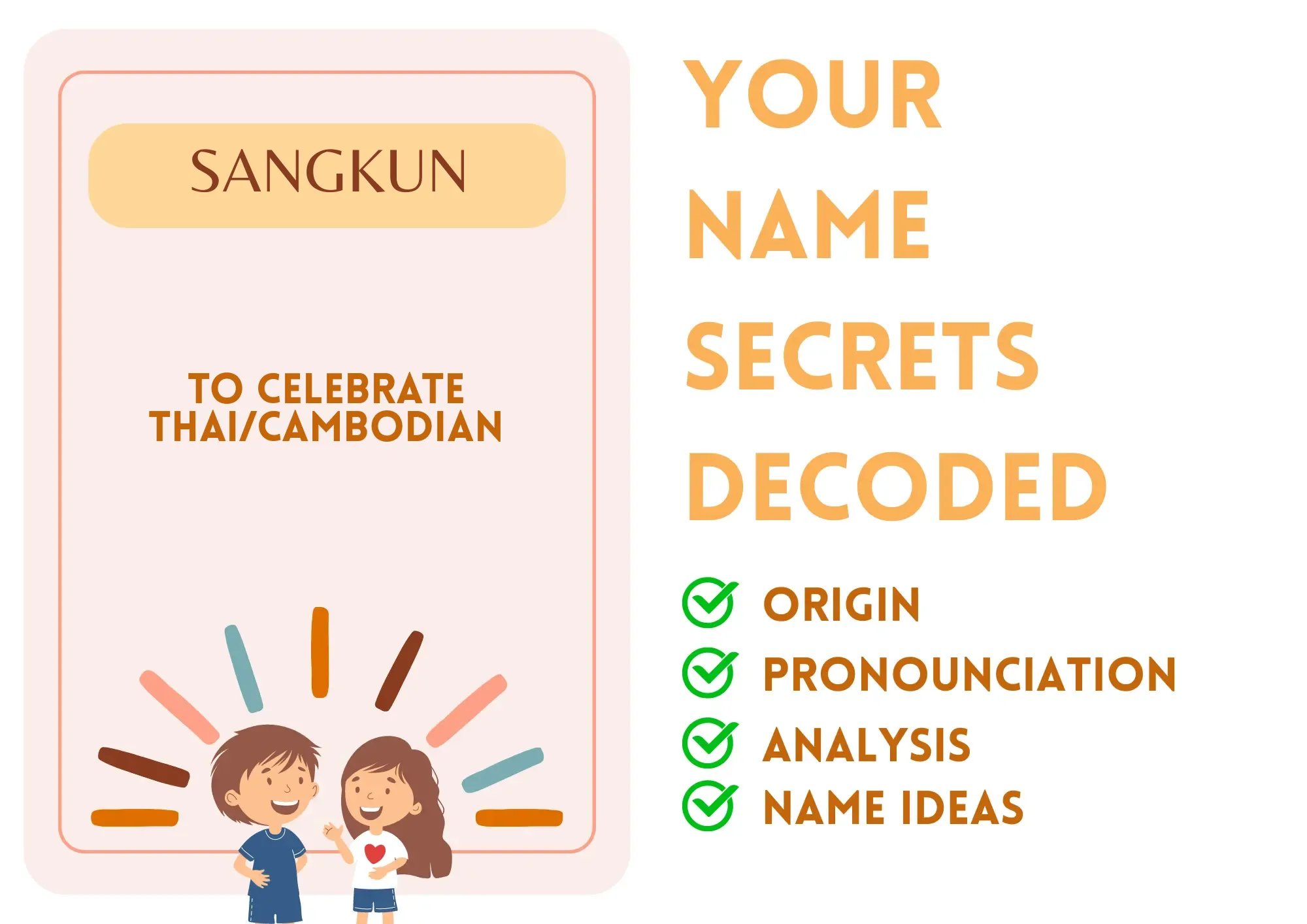
Sangkun
Sangkun is a unique name with a rich linguistic presence, primarily found in Southeast Asian cultures, such as Thai and Cambodian. The name is derived from the word for 'to celebrate' in some interpretations, signaling joy and festivity. It is considered a masculine name but can also be applied as unisex in certain contexts.
The name is often appreciated in cultures that value communal celebrations, reflecting goodwill, happiness, and a sense of community. Sangkun is relatively uncommon outside of its origin regions, making it a distinctive choice.
In terms of perception, Sangkun evokes positive emotions, associated with festivity and happiness. It is fairly easy to write and pronounce, with a high potential for misinterpretation due to variations in spelling. Common variations include Sangkoon and Sangkunh.
While Sangkun does not have a widely acknowledged presence in global pop culture, it resonates within local stories and folklore related to festivals and celebrations, enhancing its cultural importance.
Basic Information
Gender: Unisex
Sounds Like: SANG-kun
Pronunciation Explanation: The first syllable 'SANG' rhymes with 'hang,' and the second syllable 'kun' is pronounced as in 'sun.'
Summary and Meaning
Meaning: to celebrate (Thai/Cambodian)
Origin: Sangkun has origins in Southeast Asian languages, particularly in Thai and Khmer cultures.
Usage: Primarily considered a masculine name but can be used for any gender.
Name Number (Chaldean)
Name Number (Pythagorean)
Popularity (Global Rank)
Overall: 1013025
Boys: 72681
Girls:
Most Popular in
Religious and Cultural Significance
Religion: Buddhism
Background: In regions where Sangkun is prevalent, Buddhism often plays a significant role in cultural and spiritual contexts, guiding the values associated with the name.
Cultural Significance: The name Sangkun aligns with festivities and communal joy, reflective of local cultural practices that celebrate life and unity.
Historical Significance: The name may not have extensive historical significance but embodies the importance of social gatherings and cultural celebrations that are vital in Southeast Asian history.
Popular Culture
Literature and Mythology: Sangkun may appear in local stories or folklore centered around festivals, but it lacks widespread representation in major literary works.
Movies and Television: There are limited references to Sangkun in international cinema; however, local films may highlight themes of festivity linked to the name.
Feelings and Perceptions
Perception: Sangkun is viewed positively, evoking joy, festivity, and community spirit. It is often associated with warmth and celebration.
Positive Feelings: Unique, festive, joyful, communal, cultural, and celebratory.
Negative Feelings: May be perceived as too uncommon or mispronounced, limiting its appeal to some.
Practical Considerations
Ease of Writing and Calling: Sangkun is simple to write and pronounce, comprising seven letters and two syllables, making it easy to recall and pronounce correctly in many contexts.
Common Typos and Misspellings: Sangkoon,Sangkunn,Sangkunh,Sangkan
Common Nicknames: Sang,Kuni,Kun
Sangkun Popularity
Sangkun Usage and Popularity By Country
| Country | Rank (Overall) |
|---|---|
| Canada | 149654 |
| United States | 344452 |
Sangkun Usage and Popularity By City
| City | Rank (Overall) |
|---|
Compatibility Analysis
Famous Persons Named Sangkun
No results found for Sangkun.
Related Names
Similar Sounding Names:
Sangun,Sankun,Sankoon
Similar Meaning and Related Names:
Sibling Name Ideas (Brothers):
Sibling Name Ideas (Sisters):
Nari 
Hindu, Buddhist, and others
